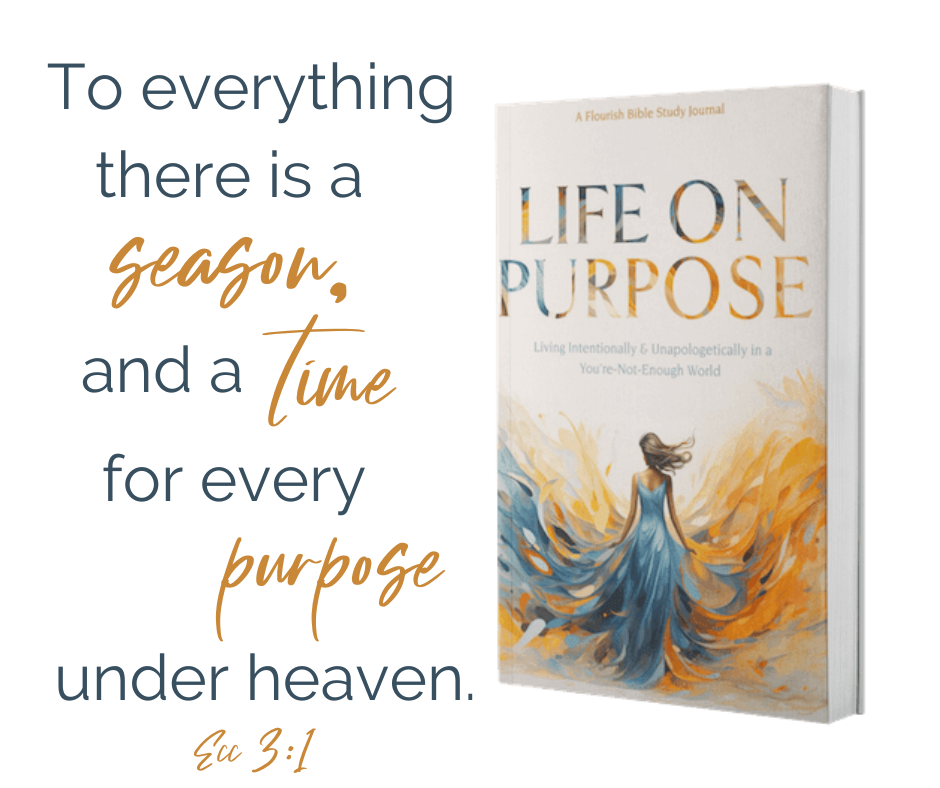It’s the perfect summer day. The temperature is sublime with a gentle breeze blowing while I sit on my front porch, enjoying a few quiet moments alone. Just minutes into my soak in serenity, my daughter joins me, and we start chatting—first about the day thus far, then about the glorious weather and fresh air. I take a few deep breaths and quietly thank God for this sweet time together, allowing my mind and my heart to fully embrace the present moment.
Can it get any better? Just then my daughter asks, “Mom, do you believe in soulmates?”
Over the next forty-five minutes, I have one of the best-ever conversations with my teenage daughter. We discuss complex topics like free will, God’s sovereignty, and His purpose for our lives. I share with her my deepest thoughts, all while inviting the Holy Spirit to join us in our conversation.
I see reflected in my young daughter the way we all seek answers to the big questions of life. We want to know the purpose in our lives, make sense of our pain, and understand the reality of our present circumstances. As I’ve navigated many seasons of my own life, I haven’t always had answers to those questions at the time, but in hindsight I perceive past seasons with greater clarity and understand their purpose.
Yet when we find ourselves knee-deep in a difficult season, it’s natural to cry out to God, “What’s the purpose in this? I don’t understand what you’re doing!”
How quickly we forget that each season is for our growth, for our good, for our becoming. But don’t tell me that when I’m suffering.
Only a few short years ago, I found myself in a challenging season, the kind that has no obvious end. I thought, Is this going to be reality for the rest of my life? It was the type of season where you can’t imagine what good purpose is being achieved—a season where you doubt the nature and heart of God. Yet it turned out to be a time that drew me closer to the heart of God than ever before. I simultaneously doubted God’s goodness and praised his presence—sometimes day-by-day, but most of the time minute-by-minute. The months and years wore on, but God comforted me in my distress.
This season taught me to see every day as an invitation to commune with God. Each moment of life is intentionally designed to draw us closer to the heart of God. He desires that we invite Him into a close, personal relationship. It’s difficult for our minds to grasp the intimacy He desires.
We’re easily confused, believing that God is pleased with us only when we are doing and producing big things for His kingdom, yet what He truly desires is close fellowship with us. He desires that we savor quiet moments with His word and His presence—no expectations, no agenda, no fancy assignment, just togetherness.
Tucked away in the apostle Paul’s fervent letters to his dear friend Timothy, we find an important reminder for us all: “He has saved us and called us to a holy life—not because of anything we have done but because of his own purpose and grace. This grace was given us in Christ Jesus before the beginning of time” (2 Timothy 1:9).
We cannot create a sense of purpose in our lives by anything we do. Let this thought settle in your heart for a few moments. Only through God’s purpose and grace do our lives have meaning.
Disconnected from God, we will find that all our attempts to create a sense of purpose by the strength of our hands amount to nothing. The author of Ecclesiastes tried to find the meaning of life in his own strength and warned us of the resulting despair: “I observed everything going on under the sun, and really, it is all meaningless—like chasing the wind” (Ecclesiastes 1:14 NLT).
Solomon was already desperate in chapter one. Now we see him in chapters seven through nine, despairing over the futility of a life separated from the Creator. Weariness drips like a waxy candle smothering the flame. Solomon hurls subversive statements like, “The day of death [is] better than the day of one’s birth,” and “Better to go to the house of mourning than to go to the house of feasting,” and “Sorrow is better than laughter” (Ecclesiastes 7:1–3).
I experienced my own version of Solomon’s weariness. Those hard days found me unable to do much, and it was the sweetest blessing. I didn’t have the strength to create purpose by my doing. I couldn’t do much of anything. I convalesced while others served me. I took comfort in the intrinsic God-given value of my humanity—not as a human doing but as a human being. It was a grueling journey of surrender to accept God’s affection for me in my weakened and infirmed state, but eventually I got there. Now I understand my intrinsic value deep in my soul: I can do nothing to earn more of God’s love; I can do nothing to un-earn God’s love. I am valuable because I am. Today. That’s enough.
Take a moment to imagine life without the shackles of tomorrow. No deadlines, appointments, or expectations. What does that feel like? What would it feel like to take a few extra minutes during your morning devotional, linger a little longer on your walk, or stick around five more minutes chatting heart-to-heart with a dear one?
Does the present moment always hold eternal purpose? Could seemingly mundane encounters connect us to God’s peace and presence?
Absolutely! They do! In an act of defiance, we reject the narrative advertised by popular culture. We shatter the world’s measuring stick that constantly evaluates our performance. We are wise to the cunning arguments that lure us to worship at a false altar, bringing our precious gifts, hoping to receive affirmation as we sacrifice to exhaustion, driven to prove that we are living a life of purpose. In the rush to prove our value, we fail to see that we are enslaved to a thief who will never allow us to enjoy the fruit of our labor. Never.
Awakened by holy insurrection, we turn away from the fear of missing out and from shiny-object syndrome. We sit on the porch, the sun warm on our face, and enjoy leisurely conversations with the beloved ones in our lives. This is the sacred communion—slowing down and breaking bread as a reminder that Jesus already paid the price to purchase our freedom. This is a life of purpose created by God as a gift of grace. Receive. It’s not just mine. It’s yours, my friend.


